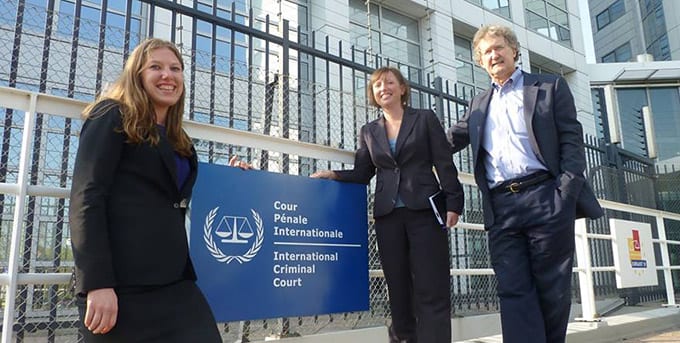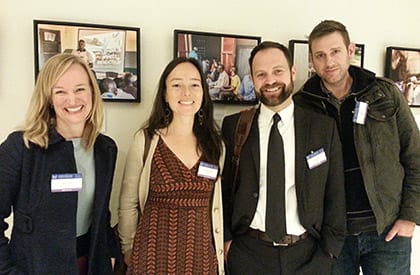
By Andrea Lampros
The International Criminal Court (ICC) in The Hague engages thousands of victims in trials each year, but falls short of satisfying their expectations for justice, according to findings from the world’s first large-scale study of survivors participating in international trials. The Victims’ Court? A Study of 622 Victim Participants at the International Criminal Court by the law school’s Human Rights Center (HRC) was undertaken at the request of the court.
“Many victims have great hopes for international prosecutions to deliver justice after conflict,” said Stephen Cody, director of HRC’s Atrocity Response Program. “But our findings suggest that the court is failing to meet its legal obligation to give victims meaningful opportunities to share their views and concerns.” Cody presented study findings to a rapt room of international judges, prosecutors, and diplomats at the ICC’s annual meeting of state parties in The Hague last month.
HRC researchers conducted in-depth interviews with victims in Uganda, Democratic Republic of Congo, Kenya, and Côte d’Ivoire. Berkeley Law alumni Pauline White Meeusen ‘15, now a doctoral student in Berkeley’s Jurisprudence and Social Policy program, and Nina Jehle ’14 are among nearly a dozen students who conducted field work or desk research during the course of the three-year study.
“Conducting interviews in the field, having the chance to meet with victims face-to-face, I became even more invested in the outcome of the study,” said White Meeusen, who assisted with fieldwork in Kenya. “Although the victims were not my clients, I wanted to see their needs and expectations met.”

The study findings suggest that the ICC create education programs to inform victims of their rights and better meet their security and psycho-social needs. If adopted, the study recommendations would reshape the way the ICC treats victims.
“We learned that, by and large, these survivors want more sustained contact with the court, more information about their cases, and greater support,” said Cody.
The ICC was established in 1998 through the Rome Statute to investigate and prosecute perpetrators of genocide, war crimes, and crimes against humanity. Member states fund the court, but the United States is not a member state.
The study found that most victim participants lacked access to information about the ICC and its mandate, were deeply frustrated by the slow pace of the proceedings, and expected to receive individual reparations—even though reparations might not be forthcoming.
“It is important for the ICC, as an international body, to assist some of the victims like us, at least to give something while we wait for the case,” said one Ugandan survivor. “In disasters, say in Asia, the victims are being assisted. Why can’t we be assisted like them? Those were disasters, but what we suffered were deliberate acts.”
War stories
Most victims didn’t feel a need to testify many miles away in The Hague, but they wanted their stories to be known.
“The judges will use this,” said another victim of the statement he provided to the court. “They will tell [Joseph] Kony,[the brutal leader of the rebel Lord’s Resistance Army] ‘See, this is what you have done. These are people from the community where you went and committed atrocities. Hear and listen to their voices.”
The study found that victims—especially those in Kenya and Democratic Republic of Congo—fear reprisals because of their association with the ICC.
“I fear for my safety,” said a Kenyan victim. “The people who I’m supposed to testify against are the people in power. They can do harm if they know that some people are talking. They may fear we are undermining them.”
The ICC is often hailed as a “victims’ court”— one that gives survivors of mass atrocity an influential voice in the administration of justice. In addition to being called as witnesses, victims have the right to be heard by ICC judges at all stages of the proceedings. They can comment on the court decisions, narrow or broaden the scope of charges against an accused defendant, even question witnesses during trials subject to judges’ approval.
“This new and expanded role for victims in international trials is unprecedented,” said Eric Stover, adjunct professor of law and the Human Rights Center’s faculty director. “This study provides the first opportunity to hear from victims themselves in order to assess whether or not the court is meeting their needs and expectations.”
The Human Rights Center’s study recommends that the ICC find ways to speed up trials because lengthy timelines can lead to anxiety, resentfulness, and feelings of abandonment. The study also recommends that ICC staff communicate with more clarity what the court can and cannot provide.
The study calls on states parties—the governments that have signed on to the Rome Statute and financially support the ICC—to invest in outreach and educational programs for victim participants, especially those living in rural areas.
In early 2016, the ICC will try Dominic Ongwen, a former child soldier in Joseph Kony’s Lord’s Resistance Army who is charged with crimes against humanity. The Human Rights Center plans to continue its work interviewing survivors before, during, and after that trial to build on its initial findings and ensure that victims’ voices are documented and heard by the court and its international funders.